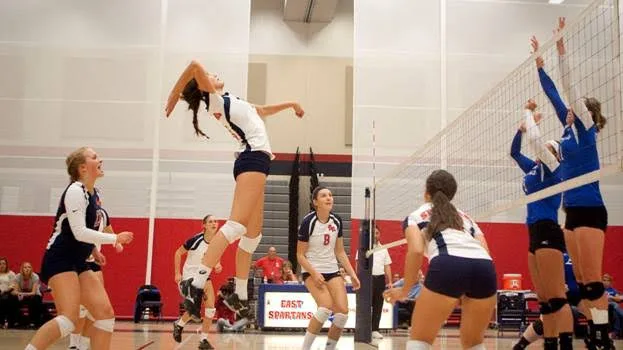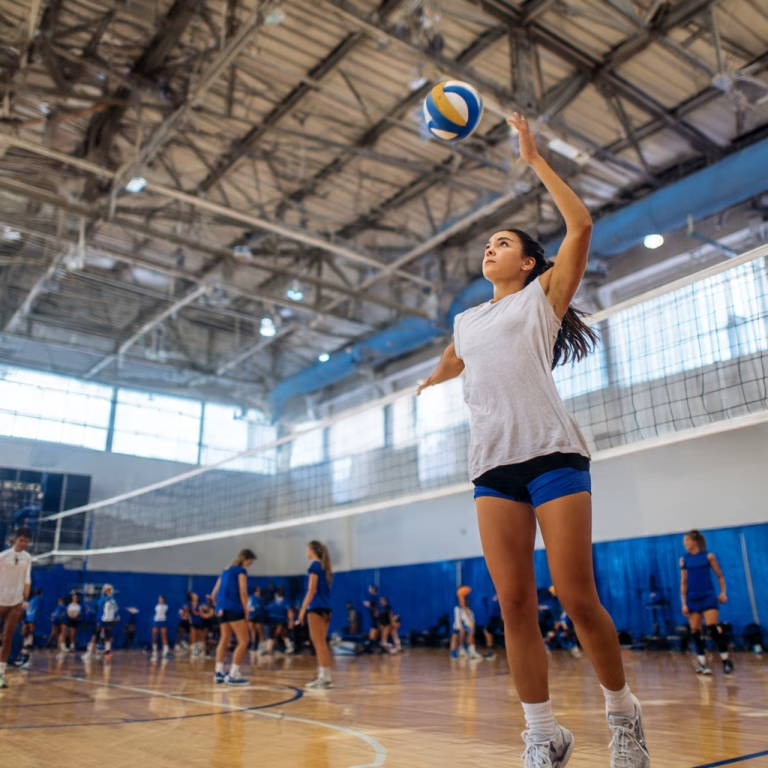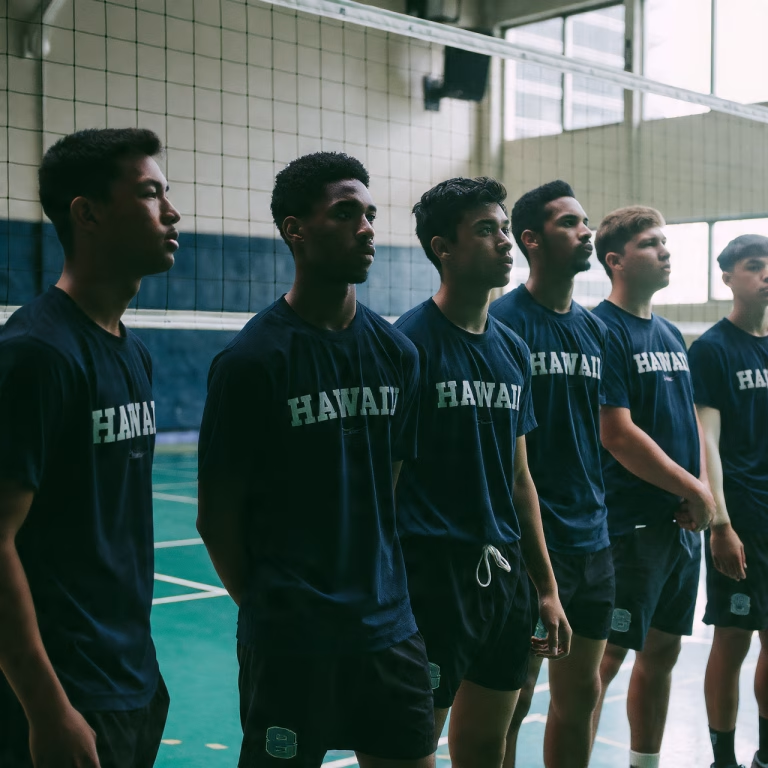I have seen a lot of people ask questions like: What is a defensive specialist? What is a DS in volleyball? How does the DS position differ from the libero position? And so on. This is very common amongst volleyball beginners and aspirants.
To make meaning of their questions, we decided to make this article to cover everything about the Defensive Specialist (DS) position in volleyball, ranging from their primary responsibilities to the skills needed to excel, and even answer some frequently asked questions.
What is a DS in Volleyball?
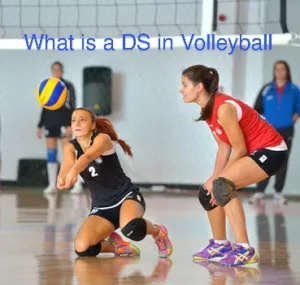
A defensive specialist (DS) is a back-row player whose primary responsibility is to improve the team’s defense. Unlike the libero, the DS is not restricted to a specific jersey or substitution rules, but their focus remains on receiving serves, digging spikes, and maintaining ball control to set up the offense.
Meanwhile, DS is simply the short form or abbreviation of defensive specialist.” It is one of the positions in volleyball. So you know now that DS stands for Defensive Specialist.
See Also: Hardest Position in Volleyball Explained
Key Characteristics of a DS
| Primary Role | Defensive play, serve receive, and digging. |
| Substitution Rules | Substituted in like regular players. |
| Jersey Color | Matches the rest of the team. |
| Specialized Skills | Passing, digging, reading the game |
What are the main responsibilities of a defensive specialist?
The DS is, simply put, the master of defense. Their primary focus is on preventing the opposing team from scoring. While they might not be the ones smashing the ball over the net for a winning point, they are the heroes who set the stage for those winning plays.
Some of their main responsibilities include:
- Reception: Receiving the opponent’s serve is a critical part of the DS’s job. A solid pass sets up the team’s offense, giving the setter a better chance to make a good set. Consistent and accurate passing is key.
- Digging: This is where the DS truly shines. Digging involves diving, rolling, and using every ounce of skill to get the ball back up after a powerful attack from the opposing team. Think quick reflexes, incredible agility, and a whole lot of grit.
- Defense: This encompasses more than just digging. It’s about reading the opponent’s attack, positioning themselves strategically, and reacting quickly to block attempts that get past the blockers. It’s about being constantly aware and anticipating the opponent’s moves.
- Serving: While not their primary role, a DS needs a reliable serve to contribute to the team’s overall scoring. A consistent serve that keeps the other team off-balance can be a huge asset.
Read more: 11 Best Volleyball Tactics and strategies to win
What skills are needed to be a great defensive specialist?
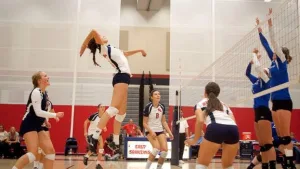 Becoming a great DS takes dedication, practice, consistency, skills, and hard work. Below are basic skills needed to become a great defensive specialist.
Becoming a great DS takes dedication, practice, consistency, skills, and hard work. Below are basic skills needed to become a great defensive specialist.
1. Exceptional Ball Control
The DS needs to be able to handle the ball under pressure, even when it’s coming at them at high speed and unpredictable angles. This involves precise passing and digging techniques.
See Also: Pin Hitter Volleyball Position and Role Explained
2. Quick Reflexes and Agility
The ability to react instantly to the opponent’s attacks is critical. This requires both speed and agility to get to the ball quickly and efficiently.
3. Strategic Positioning
Knowing where to be on the court to best defend against the opponent’s attacks is key. This involves understanding the game, anticipating the opponent’s plays, and positioning themselves effectively.
4. Stamina and Endurance
Volleyball is a physically demanding sport, and DSs are constantly moving. They need to have the stamina to maintain their performance throughout the entire match.
5. Teamwork and Communication
Volleyball is a team sport, and the DS needs to work seamlessly with their teammates. Communication is essential for coordinating defensive strategies and ensuring that everyone is on the same page.
Read More: What is MB in volleyball? Volleyball position terms explained
Difference Between a Defensive Specialist and a Libero
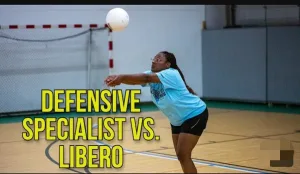
The terms libero and defensive specialist are often used interchangeably, but they are distinct positions. Below are a few differences between the DS and Libero positions:
| In terms of: | Defensive Specialist (DS) | Libero |
| Jersey Color | Matches the team’s uniform. | Wears a contrasting jersey. |
| Substitution Rules | Substituted like any other player. | Unlimited substitutions per set. |
| Position Flexibility | Can rotate to the front row. | Cannot play in the front row. |
| Focus | Defensive but more versatile. | Exclusively back-row play. |
How does the defensive specialist differ from other positions?
The DS is unique compared to other positions. Here’s a comparison:
| Position | Primary Role | Key Skills |
| Setter | Setting the ball for attackers | Setting accuracy, game awareness, quick reflexes |
| Outside Hitter | Attacking from the front and back rows | Jumping, hitting power, serving |
| Opposite Hitter | Attacking from the back row | Power hitting, blocking, back-row attacking |
| Middle Blocker | Blocking and attacking at the net | Blocking, quick attacks, height |
| Libero | Defensive specialist, back row only | Passing, digging, court coverage |
| Defensive Specialist (DS) | Back-row defence, serve receive, and digging | Passing, digging, agility, court coverage |
How Does the Defensive Specialist Contribute to Team Success?
A defensive specialist’s contributions may not always appear on the stat sheet, but they are invaluable to the team’s performance. They contribute to the team’s success in different ways, like:
1. Enhancing Defensive Coverage
The DS ensures that no gaps are left in the defense, making it harder for the opponents to score.
2. Improving Serve Receive Efficiency
A strong serve receive allows the setter to distribute the ball effectively, leading to better offensive plays.
3. Boosting Team Morale
Spectacular digs and saves can energize the team and shift the momentum in critical moments.
Drills and Training Tips for Aspiring Defensive Specialists
Becoming a great defensive specialist takes practice and dedication. Below are some drills and tips to enhance your skills:
1. Passing Drills
Work on serve-receive accuracy by practicing with teammates or a coach. Focus on delivering passes directly to the setter.
2. Reaction Training
Use reaction balls or agility drills to improve reflexes and quick decision-making.
3. Defensive Positioning
Practice proper defensive stances and movement patterns to cover the court effectively.
4. Mental Preparation
Visualize game scenarios and practice staying composed under pressure.
FAQs About Defensive Specialists
What is the difference between a DS and a libero?
The DS can play in any rotation and has no jersey restrictions, while the libero is limited to back-row play and wears a contrasting jersey.
Can a DS play in the front row?
Yes, unlike the libero, a DS can rotate to the front row, though they are rarely used as attackers.
Can a defensive specialist also attack?
Yes! While their primary focus is defense, a good DS can contribute offensively with well-placed attacks, especially from the back row. They might not have the same power as outside hitters, but their strategic attacks can be effective.
Is the DS position necessary for all teams?
Not all teams utilize a DS, but they are highly beneficial for strengthening the defense and serve receive.
What skills are most important for a defensive specialist?
Key skills include passing, digging, reflexes, court awareness, and communication.
How does a DS differ from other volleyball positions?
The DS specializes in defense and ball control, focusing exclusively on back-row play and serve receive rather than attacking or blocking.
Is it harder to be a defensive specialist or a libero?
Both positions require a unique set of skills and dedication. The DS has the added responsibility of serving and playing in the front row, which adds complexity. The Libero has restrictions on their play, but their focus is solely on defense. Ultimately, the “harder” position is subjective and depends on individual strengths and preferences.
Conclusion
The defensive specialist is one of the most important positions in volleyball. The position is an essential part of any successful volleyball team. Their dedication to defense, combined with their ability to contribute offensively, makes them invaluable players.
To become a great DS, you should focus on fundamental skills like passing and digging. Practice drills that simulate game situations, such as quick reaction drills and high-speed ball handling.
You can also work with a coach to identify areas for improvement and develop a personalized training plan.
Read More: Hardest Position in Volleyball Explained

